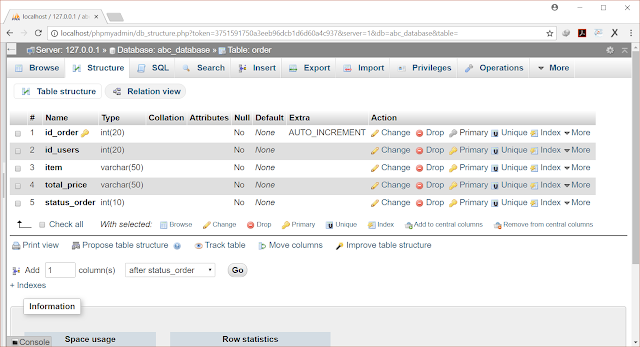
- #Mysql count rows in all tables how to
- #Mysql count rows in all tables drivers
- #Mysql count rows in all tables code
I didn't mention before that NULL in multiindexes is only available in MyISAM tables. We search on an index, using a pre-prepared statement handle with placeholders.
#Mysql count rows in all tables code
In fact I didn't exhibit any DBI code at all.įor frequent operations, we can improve performance with the sth->bind_params() method. I never said to use the error for program control. My point was to demonstrate the property of unique indexes which prevent duplication: a safety measure. I didn't believe in evil until I dated it. I don't know why, but I had to work around by doing the SQL myself :(Īlso, talking coding style, finding out if you can do something by seeing if it throws an error is probably a worse option than checking for it cleanly in the first place. At one point I had Tie::DBI crashing when it got an error from the POSTGRESQL database saying the the database couldn't insert a row. I created the table in a Sybase database, filled it with about 2500 rows with my db-stress tool and tested against it (with only 1000 iterations). Most RDBMS won't even consider using an index on a table with only 4 rows due to the overhead in I/O and processing.
#Mysql count rows in all tables how to
Re: Re: Re: How to count rows using DBI & mysql - Performance results So I think I am correct that there is an index by default on the leftmost column. In fact, not having indexes doesn't seem to make any difference (1230/sec vs. Only there are only 4 rows, so testing the remainder of the AND should be quick. It should be intelligent enough to only compare the second row if the first row succeeds. I believe that MySQL creates an index on the leftmost subset of columns anyway, due to the way it stores I hadn't thought of getting SQL to do the logic. Re: Re: How to count rows using DBI & mysql - Performance results Way4A 3077/s 184% 158% 155% 146% 146% 36% 34% 0% -Īn index on the columns in where clause might have a huge impact if you use count(*). Rate Way5A Way6A Way1A Way5B Wa圓A Way2B Way2A Way4B Way4A My $sql = "SELECT COUNT(*) FROM depend WHERE usedby='Depend::Module +' AND uses='DBI'" # Incorrect result, only checks first field # Fetch each row manually and do our own count My $sql = "SELECT usedby FROM depend WHERE usedby='Depend::Module' +AND uses='DBI'" My $sql = "SELECT uses FROM depend WHERE usedby='Depend::Module' AN +D uses='DBI'" My $sql = "SELECT * FROM depend WHERE usedby='Depend::Module'" My $sql = "SELECT uses FROM depend WHERE usedby='Depend::Module'" # Doesn't count second field in this routine #use strict # because of the sub references This would propagate back through the do() result.
#Mysql count rows in all tables drivers
To suggest that some drivers return -1 untill all rows are fetched.


In particular, I thought thatĭo() was just a wrapper round prepare/execute, so the time difference is

do() is more than twice as fast as prepare()/execute().using WHERE A='X' AND B='Y' is faster than WHERE A='X'.


 0 kommentar(er)
0 kommentar(er)
